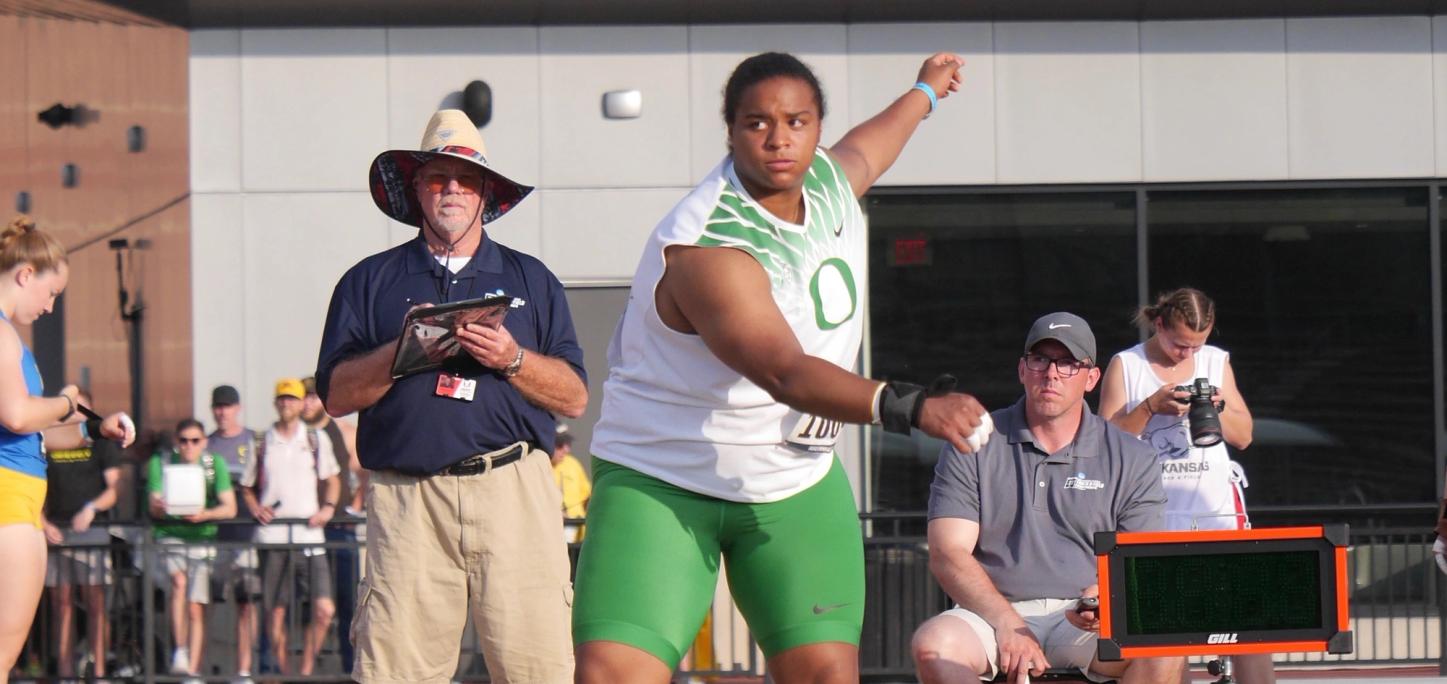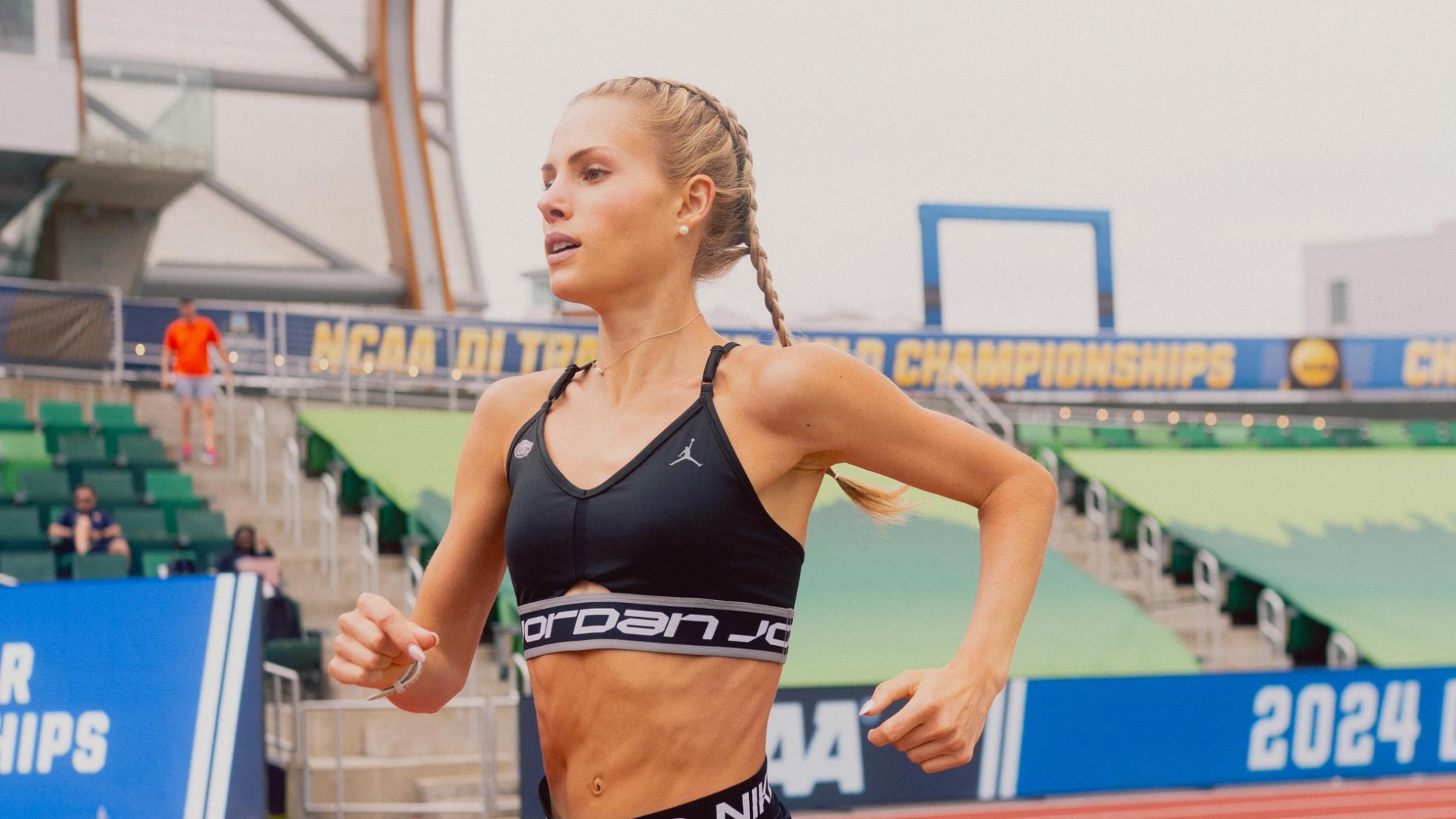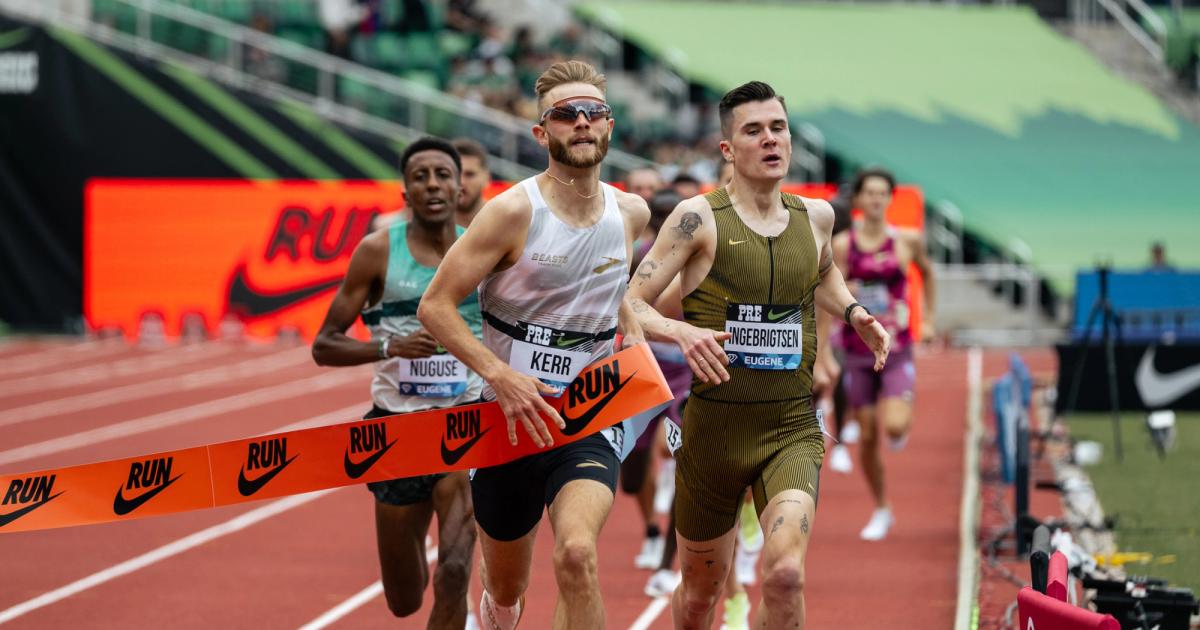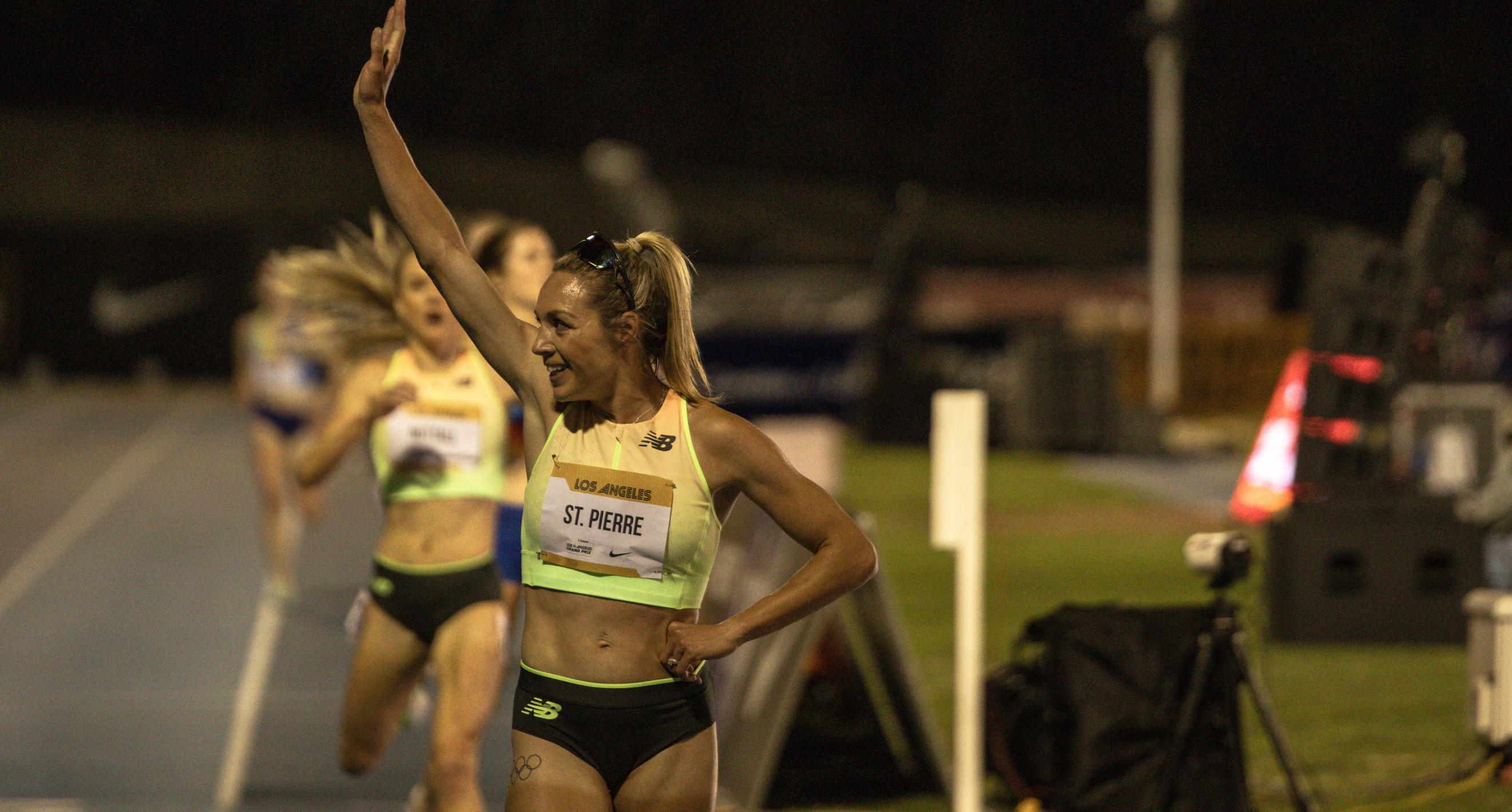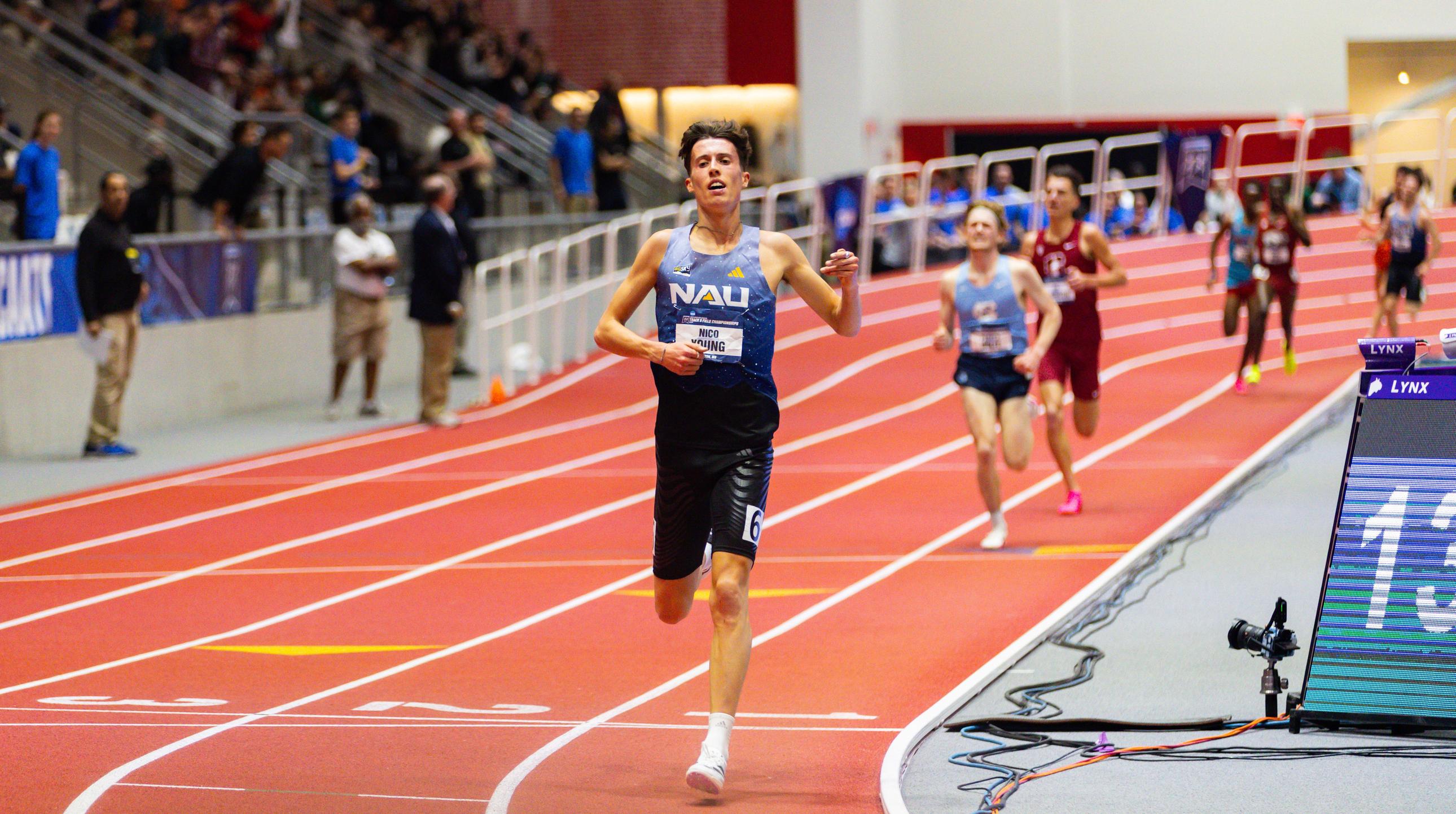By Paul Hof-Mahoney
June 4, 2024
University of Oregon senior Jaida Ross has had a season that can only be described as historic. After a runner-up finish by just six centimeters at NCAA Indoors, Ross has torn the outdoor record books apart. She broke the collegiate record in her opener, throwing 19.71m, equalled that mark three weeks later, then became the first woman in collegiate history to break the 20 meter barrier at NCAA West Regionals last Thursday with a mark of 20.01m.
We got the chance to catch up with Ross just before she reaches the most critical part of her season, with NCAA Outdoor Championships coming up next week and Olympic Trials on the horizon. Ross spoke about the mental side of throwing, how she got into the sport, and what’s gone into her meteoric rise this spring.
CITIUS Mag: Let's go back to that first time you broke the collegiate record. In early April, your outdoor opener at the Triton Invitational, 19.71m. Can you just kind of talk to us a little bit about what that competition was like?
Jaida Ross: Yeah, Triton is one of my favorite meets to go to. This is my second year in a row that I had two big PRs for both events. The atmosphere is great, there's a lot of good throwers that come there, so I always love that. And then throws-wise, I just felt good. That big throw happened, and then I knew it was a PR, but I wasn't expecting a 19-high throw, so that felt really good. And yeah, I think I was just on that day. He said 19.71 and I was shocked, I was not expecting that. I'd been wanting to throw 19m for a while, so to start at 19.71m is a good way to start.
You had thrown a PB indoors at 18.84m, but this was still almost a full meter farther than that. You said you weren't really expecting at all something that big, at least this early in the season?
Not at all, no, I was hoping for 19m. And when he read that, I remember just screaming. I was just, “Whoa, 19.70”. So it was a happy day. Lots of smiles, lots of laughs.
Moving into this outdoor season after the really good indoor season you had, and with this being, you know, your last year, was the collegiate record something that you and Coach [Brian] Blutreich had talked about at all moving into the outdoor season, or was it really as much as a surprise for you as might have been for people on the outside looking in?
Yeah, we didn't really discuss it. I definitely heard him mention it maybe a couple of times, but we hadn't discussed it, me and him. So it was a nice little addition to a good PR. I remember even when I threw it and he said, “Oh, let's keep the mark because that's a collegiate record,” and I didn't even register it at the time. So, yeah, it was a nice little surprise for me at least. I'm sure it was on Coach Blu's radar, but, yeah, it was a nice, nice little addition to a PR.
Was getting the collegiate record at all a little bit sweeter for you since you were in the meet at the 2022 National Championships where Adelaide [Aquilla] set that record?
Yeah, I think that's kind of what it made me think of, too. I remember, first-hand seeing that she, on her first throw, got the collegiate record. So, that was amazing. And then, after the meet, Adelaide reached out to me and said congrats and everything. So, it was a cool little day for me.
So now we'll move to regionals last week, where you became the first woman in collegiate history to break the 20 meter barrier throwing 20.01m. And regionals is a meet where sometimes you don't necessarily see big throws because you only have three throws to kind of get into a rhythm. Can you kind of talk us through your second throw, that 20.01 in particular? Can you just kind of tell us what about that throw felt different from maybe either of your 19.71’s you had?
I think the biggest difference was that we kind of lightened the weight room that week. So I had a little more legs in me, and then, my technique is just fine-tuning at this point. So we're kind of in that part of the season where we're not adding anything, we're just kind of perfecting little things. So I'm feeling more confident in the ring. I felt good that day, very explosive that day. So, that first throw that I had at regionals was a little shaky. I was a little nervous, I let the nerves get to me. But my second throw, I kind of just let loose, and I just went for it, really. So, I think the difference between the 19.71 and the 20.01, I think maybe just better rhythm and timing, but for the most part, I just had more legs in me, I think is what it was.
Did you know as it was coming out of your hand that it was going to be that big?
Again, I knew it was going to be a PR. I wasn't expecting 20m, on a regional day, but, I'll take it. I'm happy with it. It felt like a PR, but when 20.01m came up, I was just as surprised as when the 19.71m came up.
I listened to an interview that [Oregon head coach Jerry Schumaker] did, I think it was the week before regionals, and he had said that Coach Blutreich had told him 20 meters was in the cards for you. Was that something you guys had been discussing after you got the collegiate record out of the way and it was 29 more centimeters to get up to that 20 meter mark. Is that something that was kind of running through your head?
Yes, definitely. You know, among those top women, 20m is kind of the respectable number. So I think that was kind of what we were going for, I wanted 20m. My teammate Kobe [Lawrence], who redshirted, had just thrown 20m at that last home meet, so I was chasing him. I've always wanted to be over 20 meters so for it to happen, I was just super, super happy about it.
Let's kind of go back a little bit to some of your high school career at North Medford High School in Oregon. You were the state champ your freshman year in shot, so that kind of makes me think you probably were throwing before you got to high school. How did you kind of find your way into the sport?
So in my childhood, I was a soccer player. Played soccer my whole life. And so then I kind of got into basketball. In middle school, my basketball coach was the head coach for my high school track team. His name's Pieter Voskes, and he said, “Hey, I think you should try to throw shot put.” And I was like, “There's no way I could pick up another sport.” I did like three sports at one time and there's no way I can do it. He's like, “No, I think you should try it.” And I tried it and I was like, “Oh, so this is what my body is built for.” You know, I'm not a runner. It felt good to just be in a sport that, you know, my body is made for and has a talent for. So that's kind of how I got into it, and then I just learned to love it and got kind of competitive with it.
Good call on Coach Voskes’s part.
Yes, and I still talk to him to this day. He'll text me after big meets and things like that. So, super grateful for my high school coaches and middle school coaches, even.
Were there any throwers, when you were kind of getting into the sport, that you really looked up to? Your freshman year was the year after Michelle Carter won gold in Rio. Was she someone that you really looked up to getting into the sport?
Yes, she was the person that I looked up to. I love her personality. She's kind, she's active in the Black community and things like that. So, she was a huge role model for me. And actually two years ago, in her last meet at USAs, I actually got to compete with her. So, this whole journey has been really surreal, from looking up to people to competing with them and then to having marks similar to theirs. It's been really surreal and really wholesome at the same time.
The rest of your high school career was really great. You won another state championship in shot put, you picked up a runner-up finish as well as two third place finishes in the discus. Unfortunately, it was cut short due to COVID, but in those three years that you had, what were some of the most formative experiences you had and some of the biggest lessons that you learned in your high school career?
That's a great question. I learned what the throws community has for people. I think kind of like, on a deeper note, being in soccer and basketball, I kind of was around other kids that were smaller than me and didn't have the build that I had. And so when I joined this community, I realized what body diversity is. In track and field especially, there's so much body diversity. There's talent in every body type. That was a huge thing that I learned, and it kind of helped me accept myself and my body and things like that. So that was one thing that I loved.
On top of that, I had amazing support, amazing coaches in high school. Aaron Williams, my throws coach, helped me with recruiting, helped me with any questions that I had for colleges. He was also a college thrower, so he helped me, you know, get an idea of what college had in store and things like that. There were just so many people that supported me and helped me and believed in me in those years. And I think that's kind of helped me become the person I am today, all that support that I had.
Like I said, you did unfortunately miss out on your senior year due to COVID. What was the most difficult part of that time for you?
The hardest thing for me was definitely not being able to finish my senior year. I had, you know, big plans that year for what I was going to do. So that was a letdown for me. But, also the hardest thing was just staying fit and staying motivated because it just seemed so dull at the time. People were only allowed out of the house for food and things like that. So, it was just hard to stay motivated and kind of keep up with training and things like that while the future looked like we weren't gonna be able to compete anytime soon.
Usually, we’d ask, “What went into your decision to go to the college you went to?”, but it seems like it might have been a pretty cut and dry decision for you, growing up about 2.5 hours south of Eugene, multiple-time Oregon state champ. Were there any other schools that had a legitimate impact on your recruitment, or what did that process look like for you?
So this decision for me was, like you said, pretty easy. I grew up a Duck fan. I love Oregon, my family's here and everything. I did visit the University of Arizona when T.J. Crater was there, and he had a huge impact on the way I view throws and things like that. He's an amazing coach, he works at Ironwood Throws Camp now, which is an amazing place that I went to when I was in high school, and that's when I started rotating. They taught me the foundations of spinning and things like that. So that had a huge impact on me. Kind of just getting into college life and I still look up to him now. So, the people I met along the way, along the visits and things like that, I still talk to, and I still see my competitors out there that I went on visits with, and they were my hosts and things like that. So, yeah, that's been great. It's been amazing.
Your first two years at Oregon were really good. You picked up a couple of All-American appearances, you went to USAs your sophomore year for shot put. But it feels like ever since Coach Blutreich got to Oregon, in between your sophomore and junior year, that's really where you kind of taken off. And, you know, he's kind of the “shot put whisperer”, he's coached five of the ten best women in collegiate history. What would you say, for you personally, are some of the biggest things that you've learned in your now little over a year-and-a-half working with Coach Blu?
Well, that's a hard question because I have learned a lot from that man. He is a throws genius. So, I've learned about technique, I've learned about repetitions, I've learned about the importance of the weight room, I've learned about different fitness aspects. And then on top of all the physical things, he's helped me a lot with different mental challenges that I've had during competing, and things like that. One thing that I'll mention is I came into my freshman and sophomore years and it was more about I would go into the meets with the mindset of, “Okay, I'm going to do the best that I can today, and that's enough for me to be happy. This is the best I can do today.”
And I think now my mindset has kind of changed a little bit to, “Oh, winning is important to me.” So I think that's where my competitiveness comes in now. And I've learned to care more about winning. Not more than anything else, but just to care about winning, because I don't think I really put an emphasis on that. But now I think that competitive aspect of me has kind of risen up a little bit, and I think Blu helped a lot with that.
With Coach Blutreich coming last year, you also got to be teammates with Jorinde van Klinken, who's one of the best double-throwers in collegiate history. How beneficial was it for, as you're still kind of coming into your own as a thrower, to not necessarily have to wait for the Pac-12 Championships, or Regionals, or NCAAs to have really elite competition because you had elite competition with you every day in practice?
That was extremely helpful. I remember when she first came in, my goal was to just observe and absorb all the information that I could, all the knowledge that I could from her and Blu. And then training with her was extremely helpful. I got to see the way that she implemented the technique, the different views that her and Blu have, like the different ways you could say the same thing. And then on top of that, she's a great friend. So I'm super grateful to have had her as a teammate and, you know, I'll see her around Hayward sometimes. She was just here for a little bit for the Diamond League meet. Super grateful for her, and she's doing amazing things, so it's going well.
She posted something on Instagram a week or two ago that I thought was really interesting. We’ve mostly talked about shot put so far, but you're also a phenomenal discus thrower too, a hair under 60m this year. She talked about how doing that double can be really hard sometimes. And I feel like from an outside perspective, it just looks like the movements in rotational shot and then in discus can look pretty similar, so it's hard for us to imagine why they could actually be so different. Could you speak to your experience with trying to perfect both of those techniques at the same time?
So I'm naturally a shot putter, which means on my finish, I like to jump. Get as tall and as high as I can and extend as high as I can to get some lift. And that works in the shot technique, but for discus, you're not supposed to jump. You're supposed to stay down and long and out, which I naturally do not do. So, that's what Jorinde is kind of talking about a little bit is that the more you learn the discus technique, it kind of hurts shot because now you're not jumping in shot.
So it's kind of like a teeter totter of which one you're good at. For me personally, my biggest issue in the discus is that I like to jump, which I just get too much lift on my disc and it doesn't get that nice flight out. So that's what I struggle with in the discus. And then coming from like disc to shot practice, sometimes I'm not getting enough up or I'm not doing the technique right because I'm doing discus technique in the shot, right? So it gets confusing sometimes because the difference between shot and disc is shot is up and disc is out.
So when you mix those two up, the technique doesn't go as well. So after a disc practice, you'll see practice with shot drills just to get that out of my head for the next day. And after shot practice, I'll do some disc drills to get the shot out of my head for the next day. So, it's just kind of a fine balance of perfecting each technique and not mixing them together.
You've gotten better each year you've been at Oregon, but this year in particular. Your personal best at the end of 2023 was 18.49m. Now it's over 20m, which is just ridiculous. If you had to pinpoint one thing that you could really attribute a majority of that improvement to, more than just what we would naturally see, what would you say that is?
I think one of the biggest things is that I’m healthy this year. I struggled with some back injuries last year. Then I couldn't lift as heavy as I wanted to, couldn't move as well as I wanted to. And, I worked on some fitness, I worked on some rehab things, and now my back is healthy. So now I can lift super heavy, travel the next day, and still be good the next day to compete if that's what I need. So, things that took a harder toll on me before aren't as bad now, just because I have that strong base aspect for my back and everything. So that's a big, big factor that's helped me this year. And then also, I feel a little fitter and I'm definitely stronger this year, which has helped a lot, especially in the shot.
With that improvement, you've gone from a contender on the national level to the woman with the three farthest throws in collegiate history. You made The Bowerman watch list, which is a big deal, but especially for throwers because they don't get enough love when it comes to The Bowerman. How have you been handling that added pressure on you, going from just a contender to one of the biggest names in the country right now?
So I work a lot on my mental health, I was a psych undergrad and everything. So, I think I take all that pressure and I just use it as more motivation, more competitiveness, rather than harmful pressure. So I don't let any of this get to my head. I'm a pretty humble thrower anyways, so I don't overthink things, I don't get too deep into things like my success and everything. I don't let it get to my head a lot. I'm out here to compete, I’m out here to throw far, and I'm here to do that every meet.
And, I think the biggest thing I think of is once the meet's over, so is the mark. So, as cool as my 20 meter throw was, it was a regional meet. We made it to the big meet, now we have to compete at the big show. So I think my mindset is every meet is a start is a way to start over, and just compete again.
What does training look like for you right now? Because for you, you have to peak for NCAA Nationals next week, and then you have the Olympic Trials two-and-a-half weeks after that, and then you might also have the Olympics about a month after that. So, you know, professionals, they only have to factor in two peaks. But when you're looking at the way that you have your training set up right now, is Nationals a peak for you? Or, with the fitness you're in right now, is it kind of just another meet on the path to Trials?
Right now the peak season will be for both Nationals and Trials, and then after that will be kind of “Hope that I make it and hope everything goes well.” But I am peaking for Nationals. I had my last heavy lift on Monday, my last heavy squat lift on Monday, and we'll start lightening everything up and getting some speed and some quickness going. So I'll feel good for Nationals. And in that two week period, I'll probably have maybe one more heavy lift and then kind of restart a mini-peak. So, these are my two big meets this season, and these are the two that I really want to do well at.
Looking ahead to Trials for a second, are you planning on competing in both shot and discus at Trials, or just in shot put?
Just shot for trials. Yeah, I think this will be my last discus meet ever. I love the sport, but I'm just a shot putter.
You have some national team experience, you were the NACAC U23 champion last year, but what would it mean to you if you can make it on to the senior team and go to Paris in August?
That is a life goal of mine so that would mean the world to me, really, and to my family. I have been dreaming of the Olympics literally since I was a child. And, again, I'm big on mental health, and ever since I was a child, whenever I signed my name, I put “USA” on the bottom just to manifest that someday, maybe I'll make a USA team. So it's a life goal of mine and it would mean everything to me. And it's nice too, I feel like I'm kind of an underdog in this meet, so I really don't have much to lose for this meet. I just get to kind of have fun and compete the way that I usually do.
Last question, I don't know if you saw, but this morning World Athletics announced that they might be looking to experiment with lightening the women’s throwing implements, primarily the shot put and javelin. Any thoughts on that or…?
I think it's good how it is. I think, you know, women are pushing that 20 meter boundary right now. So, personally, I mean, I don't know a lot about the specifics of the weight, whatever the importance is. I think a lot of us have thrown 4Ks our whole lives, so, I don't know. It would be a big change. But I'm sure it would help with the audience, with it going farther. I don't know what the reason is, but I like 4K personally. I think it's a fair weight for women, and we're getting there.
Yeah, you guys are getting it farther on your own, I don't think you need any help in changing the weight.
Yeah, they’ll see. It's coming.
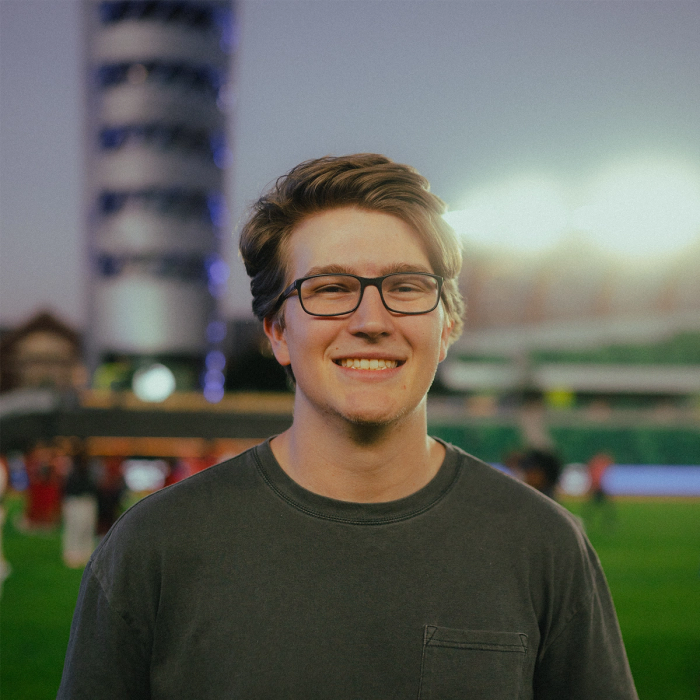
Paul Hof-Mahoney
Paul is currently a student at the University of Florida (Go Gators) and is incredibly excited to be making his way into the track and field scene. He loves getting the opportunity to showcase the fascinating storylines that build up year-over-year across all events (but especially the throws).
